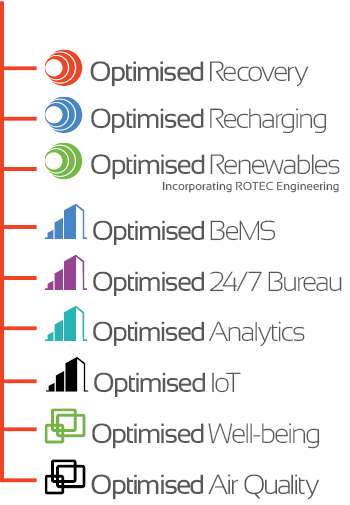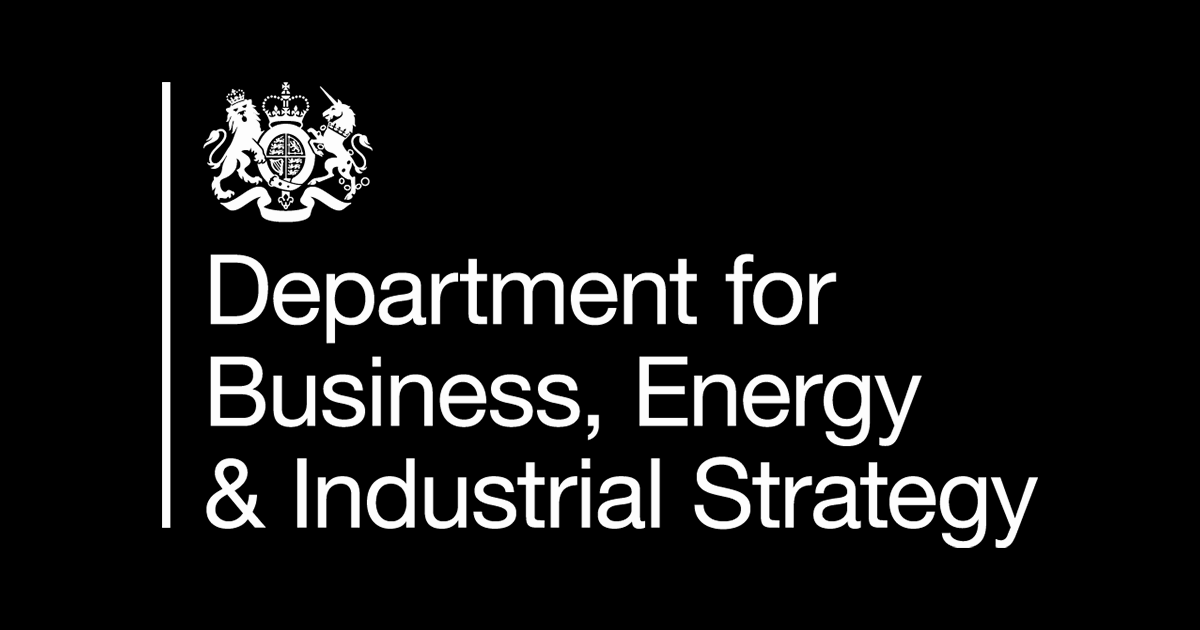THE POWER BEHIND MORE
PROFITABLE INVESTMENTS
Single provider to address all your energy needs in commercial real estate.
THE POWER BEHIND MORE
PROFITABLE INVESTMENTS
Single provider to address all your energy needs in commercial real estate.
Maximising real estate asset value through optimised energy efficiency, generating; lower energy spend, reduced carbon emissions and improved occupier well-being.
Real estate and the needs of its occupants is changing to a level that has never been seen before.
As a result, it is no longer enough to simply deliver a comfortable working environment at a competitive price. We must provide flexible, innovative, cost effective space and while doing that of course it must be on-course to achieve the aggressive net-zero government targets. Doing things the way you have always done them is no longer enough, like it or not real estate companies need to innovate and bring greater value to their occupiers. At the Optimised Group we have pulled together best of breed technologies and services to bring many aspects of managing energy for real estate owners and operators under a single umbrella which we strongly believe will help you on your journey.
If you are to create better returns from your property portfolio, then minimising operational costs is essential. Expert building and utilities management can help you do that, yet cost efficiencies need to be balanced against the need to provide a quality space and environment to tenants that ensures you meet your responsibilities, while creating high occupancy, as well as cost-efficiency.
Maximising real estate asset value through optimised energy efficiency, generating; lower energy spend, reduced carbon emissions and improved occupier well-being.
Real estate and the needs of its occupants is changing to a level that has never been seen before.
As a result, it is no longer enough to simply deliver a comfortable working environment at a competitive price. We must provide flexible, innovative, cost effective space and while doing that of course it must be on-course to achieve the aggressive net-zero government targets. Doing things the way you have always done them is no longer enough, like it or not real estate companies need to innovate and bring greater value to their occupiers. At the Optimised Group we have pulled together best of breed technologies and services to bring many aspects of managing energy for real estate owners and operators under a single umbrella which we strongly believe will help you on your journey.
If you are to create better returns from your property portfolio, then minimising operational costs is essential. Expert building and utilities management can help you do that, yet cost efficiencies need to be balanced against the need to provide a quality space and environment to tenants that ensures you meet your responsibilities, while creating high occupancy, as well as cost-efficiency.
READ OUR CASE STUDIES - WE'RE PROUD OF OUR RESULTS
We work closely with end user clients typically becoming an outsourced extension of their own energy team delivering a range of services specific to their needs. As a one stop shop we focus on clients needs whilst also procuring our services through FM's, managing agents and strategic partnerships.
Innovation - we use best of breed technologies in the market integrating these with processes where business benefits can be derived. our partnerships with some of the best tech providers in our industry enable us to deliver innovation to our clients with quantifiable business value.
Our Remote Optimisation Centre ensures that portfolios of buildings and other assets are being continually managed and 'optimised'.
20,000 tonnes of carbon emissions eliminated thanks to green gas deal at King's Cross NC1
12 COVID secure workstations and "wellness room" installed for Dexcom Camberley facility
Stop Falling Short of Energy Regulations
The climate and energy policy tracker below outlines all current UK climate and energy related policy, legislation and regulation that could impact your sector, all available UK capital funds that support investment into decarbonisation initiatives and what’s upcoming on the horizon (scheduled or under consultation).
Envt Disclosure under
The Companies Act 2006
Eligibility
Quoted UK Companies
Key Requirements
Quoted companies are required to include disclosures in their annual directors' report;
- the main trends and factors likely to affect the future development, performance and position of the company's business; and information about:
- environmental matters (including the impact of the company's business on the environment), the company's employees, and social, community and human rights issues.
Timelines
2006 onwards
Streamlined Energy & Carbon Reporting (SECR)
Eligibility
Quoted, large unquoted companies and limited liability partnerships (LLP) need to meet both of these criteria: -
- Employs > 250 people
- Annual turnover > £36m
Key Requirements
Eligible companies need to report their energy use in kWh and scope 1 and scope 2 GHGs for all energy used within their financial control and include an intensity metric suitable to the business.
Narrative on any efficiency actions taken and how data obtained and calculated including emissions and estimates.
Report needs to include previous year to show comparison.
Timelines
Every financial year after 1st April 2019
Energy Savings Opportunity Scheme (ESOS)
Eligibility
Large UK Businesses
Meet either Employees or Financials
- Employs > 250 people
- Annual turnover > £44 million and balance sheet > £38 million.
Key Requirements
Requires all eligible companies to audit their energy use in four-yearly cycles. These assessments are audits of the energy used by their buildings, industrial processes and transport to identify cost-effective energy saving measures.
.
Timelines
The deadline for ESOS phase 3 is 5 December 2023
TM44 Air Conditioning
Inspections
Eligibility
Qualifies if a building has a total comfort cooling output capacity of 12kW across the whole building.
*Re-evaluation required Should additional units be installed.
Key Requirements
Energy Performance of Buildings (E&W) Regulations 2007. Requirement to undertake a 5 year energy efficiency inspection of all A/C systems within a building with a total rated output of 12kW. Inspection report lodged on the Government Landmark website and must be readily available for audit. Report provides opportunities to improve efficiency.
.
Timelines
Every 5 years from April 2021
EPC (Minimum Level of Energy Efficiency Standard)
Eligibility
Rented UK commercial and public buildings.
Key Requirements
Existing regulations require all privately-rented properties in England and Wales to be at least EPC E by April 2023.
Where leases expire, property has to meet EPC E before it can be re-leased. After April 2023 Landlords are legally bound to bring their properties up to this rating, irrespective of whether occupied.
Intention to introduce the requirement to meet an EPC rating of B or above by 2030 with a potential interim requirement to introduce a C rating by 2027.
Timelines
2019-2023
TCFD
Implementation
Eligibility
Premium listed UK companies.
Key Requirements
The Financial Conduct Authority (FCA) has confirmed that, from 1 January 2021, premium listed companies in the UK will be required to make better disclosures about how climate change affects their business, consistent with the recommendations of TCFD for accounting periods beginning on or after 1 January 2021 (first reports anticipated in spring of 2022).
The new Listing Rule requires premium listed companies to report against all four pillars (Governance, Strategy, Risk Management Metrics and Targets) and 11 detailed TCFD Recommendations on a comply or explain basis.
Timelines
Jan 2021
Sustainable Finance
Disclosure Regulation (SFDR)
Eligibility
EU Financial Market
Participants.
Key Requirements
The European Union’s Sustainable Finance Disclosure Regulation (SFDR) applies in stages from 10 March 2021 and will impose new transparency obligations and periodic reporting requirements on Financial Market Participants (FMP’s) at both a product and entity level. The new SFDR legislation will require reporting on the following three factors;
- Sustainability risk: Asset managers will be required to assess sustainability risk in a systematic manner, integrating sustainability risks into investment decision making.
- Principal Adverse Impacts (PAI): Asset managers will be required to report on their due diligence policies regarding PAI.
- ESG Approach positioning: Asset managers will be required to report on underlying ESG approach and impact
Timelines
Staggered introduction of disclosure requirements 2021-2023
Ecodesign for Energy-Related Products and Energy Information Regulations
Eligibility
Manufacturers of energy-related products.
Key Requirements
Provide new ecodesign and energy labelling requirements for certain energy-related products that are placed on the market in Great Britain. Including updated ecodesign requirements to increase the minimum energy performance and set material efficiency for electric motors, household appliances and electronic displays.
They also introduce such requirements for welding equipment and commercial refrigeration for the first time.
Timelines
Came into force July 2021
Current Climate & Energy Related Incentives
Super-
deduction
Eligibility
UK registered companies purchasing qualifying plant and equipment.
Support Offered
The super deduction tax means that eligible businesses can get a 130% write-down on taxable profits against qualifying plant and machinery equipment before 31 March 2023.
Timelines
The measure will have effect in relation to qualifying expenditure from 1 April 2021 and will exclude expenditures incurred on contracts entered into prior to Budget day on 3 March 2021.
Is your building working efficiently for you?
Actions taken as a result of good energy metering, monitoring and optimisation can save 10-20% of the total energy consumed in office buildings.
There are many challenges when it comes to taking over a building from contractors. Buildings are rarely commissioned properly, meaning that managing agents must resolve base build plant and controls issues while keeping tenants satisfied with limited service charge budget. Buildings are being tasked with ambitious energy efficiency targets under the Better Buildings Partnership (BBP), yet it is difficult to balance occupant comfort with energy efficiency through building control strategies.
Occupiers are increasingly demanding low cost, transparent green energy supplies over the long term and Facility Management contractors are typically not incentivised enough to drive down energy costs and as a result owners, landlords and tenants are not getting the best results out of their building assets.
When it comes to metering, energy and water metering are not always MID compliant, nor do they enable utility recharging inline with the RICs code of conduct. Recharging utilities to occupiers is complex and requires a combination of specialist engineering, software, and utility management expertise in order to reduce service charge costs and manage cash flow.
As a result of some or all of the above, buildings invariably don’t perform in the way the occupiers, managing agents, Landlords and Owners expect them to.
Is your building working efficiently for you?
Actions taken as a result of good energy metering, monitoring and optimisation can save 10-20% of the total energy consumed in office buildings.
There are many challenges when it comes to taking over a building from contractors. Buildings are rarely commissioned properly, meaning that managing agents must resolve base build plant and controls issues while keeping tenants satisfied with limited service charge budget. Buildings are being tasked with ambitious energy efficiency targets under the Better Buildings Partnership (BBP), yet it is difficult to balance occupant comfort with energy efficiency through building control strategies.
Occupiers are increasingly demanding low cost, transparent green energy supplies over the long term and Facility Management contractors are typically not incentivised enough to drive down energy costs and as a result owners, landlords and tenants are not getting the best results out of their building assets.
When it comes to metering, energy and water metering are not always MID compliant, nor do they enable utility recharging inline with the RICs code of conduct. Recharging utilities to occupiers is complex and requires a combination of specialist engineering, software, and utility management expertise in order to reduce service charge costs and manage cash flow.
As a result of some or all of the above, buildings invariably don’t perform in the way the occupiers, managing agents, Landlords and Owners expect them to.
Optimise your assets and your BeMS to gain energy savings.
Recover energy costs where suppliers have over-billed you. We check voltage classifications, CT Ratios and Available Supply Capacities to recover your money.
The opportunity to optimise building systems through BeMS (Building energy Management System) exists in most office buildings with a typical potential reduction in consumption of the systems controlled of around 25% leading to a short payback period, usually in less than 12 months. This is done through optimising the performance of systems, assets and in particular the BeMS that control many of the assets l eading to considerable savings in terms of energy consumption, asset life and maintenance costs.
Regardless of whether your facility has previously undertaken extensive energy saving initiatives and you are at an advanced stage of your energy efficiency strategy or if this is the first step, we are confident savings can be made.
We will review the BeMS operation including: time schedules, setpoints and control strategies along with any energy consumption data that will help us identify where energy is wasted. We will also review the physical HVAC plant and identify areas of savings due to assets configured incorrectly, equipment in manual or areas that may require maintenance or repair. All of which will be formed into a strategy agreed with the operator and documented to get the facility back on track.
Optimise your assets and your BeMS to gain energy savings.
Recover energy costs where suppliers have over-billed you. We check voltage classifications, CT Ratios and Available Supply Capacities to recover your money.
The opportunity to optimise building systems through BeMS (Building energy Management System) exists in most office buildings with a typical potential reduction in consumption of the systems controlled of around 25% leading to a short payback period, usually in less than 12 months. This is done through optimising the performance of systems, assets and in particular the BeMS that control many of the assets l eading to considerable savings in terms of energy consumption, asset life and maintenance costs.
Regardless of whether your facility has previously undertaken extensive energy saving initiatives and you are at an advanced stage of your energy efficiency strategy or if this is the first step, we are confident savings can be made.
We will review the BeMS operation including: time schedules, setpoints and control strategies along with any energy consumption data that will help us identify where energy is wasted. We will also review the physical HVAC plant and identify areas of savings due to assets configured incorrectly, equipment in manual or areas that may require maintenance or repair. All of which will be formed into a strategy agreed with the operator and documented to get the facility back on track.
HOW CAN YOU MAKE THE MOST OUT OF YOUR SPACE?
Discover inside knowledge on how we maximise real estate asset value through optimised energy efficiency .
HAVO - Real Estate CRE (D)
Thank you for downloading our Commercial Real Estate datasheet.
For more information, please contact real.estate@theoptimisedgroup.com
Please try again later.
HOW CAN YOU MAKE THE MOST OUT OF YOUR SPACE?
Discover inside knowledge on how we maximise real estate asset value through optimised energy efficiency .
Email opt in - CRE (M)
Thank you for downloading our Commercial Real Estate datasheet.
For more information, please contact real.estate@theoptimisedgroup.com
Please try again later.





















